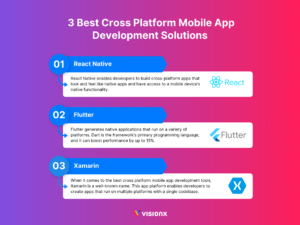The process of building software goods or services for several platforms or software environments is known as cross-platform development. Engineers and developers employ a variety of techniques to handle diverse operating systems or settings for a single application or product.
The term “cross platform mobile app development” refers to a method that allows developers to create a mobile solution that is compatible with many operating systems and platforms at the same time such as Android, iOS and Windows.
Importance of Cross Platform Mobile App Development
Cross platform mobile app development services are very much in demand nowadays. Whether your organization is developing a mobile app for the app stores or internal usage, you will almost certainly need to design it for various platforms. This usually entails addressing both iOS and Android devices.
Market research reveals that the U.S. consumer market is split roughly 47 percent Apple and 52 percent Android which is why developers cannot target a single platform alone.
Some companies have the budget and resources to have two development teams. While building in the native tooling of each platform has the benefit of being nearer to the platform, it comes at a price. There is a cost for hiring native developers and the code base is not shareable. This means there will be two separate code bases requiring separate maintenance.
In case of an update in business design, the separate code bases need to be updated as well. Moreover, it’s hard to align user experience across each platform. Cross platform mobile app development act as a solution for these challenges.
Best Cross Platform Mobile App Development Solutions
There are many available cross-platform solutions for mobile app development including:
React Native
React Native is a React-based open-source framework that is ideal for cross platform mobile app development. React Native enables developers to build cross-platform apps that look and feel like native apps and have access to a mobile device’s native functionality.
This characteristic makes it ideal for use with Android, iOS, and other mobile platforms. It allows you to use JavaScript to create a quick and stylish application without compromising user experience or performance. Furthermore, this mobile app development cross platform tool has a large global network of supporters and provides helpful and clear information to help overcome any problems.
Flutter
Flutter is another excellent cross-platform solution for mobile development. It is a Google open-source framework that was released in 2017. Flutter generates native applications that run on a variety of platforms, including iOS, Android, and others. Dart is the framework’s primary programming language, and it can boost performance by up to 15%.
With a 2019 update, Google provided a beneficial feature: you’ll be supported when integrating Flutter into an existing iOS or Android app that’s on the market. Google, Tencent, and other companies are among Flutter’s supporters.
Xamarin
When it comes to the best cross platform mobile app development tools, Xamarin is a well-known name. Since 2016, it’s been an open-source utility powered by Microsoft. This app platform enables developers to create apps that run on Android, iOS, Windows, and other platforms with a single codebase.
It can be run not only on mobile devices but also on the web and the desktop. However, this utility is already a little out of date. If you choose this option, you may encounter several drawbacks. These include app overhead, high prices for professional use and insignificant support.
Benefits of Cross Platform Mobile App Development Services?
There are many benefits from using cross platform mobile app development services such as:
Cost-cutting
Organizations must form numerous teams with distinct skillsets and commit to a significant budget to fund app development for many operating systems during the native development process.
A cross platform framework, however, allows you to pool technical and human resources, cheaper and more economical to develop two apps at the same time.
Finding and training highly qualified developers takes time and money. A cross-platform app project just requires one team with less personnel, lowering development expenses by at least 50 percent.
Moreover, there is no need to learn OS-specific programming languages because most cross-platform frameworks, such as React Native, are based on JavaScript and are simple to learn.
Increased Market Penetration
By releasing an app on numerous platforms, you can reach a wider audience. With Android and iOS accounting for nearly all of the mobile operating system market, it’s critical to recognize that a generally approved app will have a far greater influence on your company’s income than an OS-specific app.
Reusability of Code
Developers may work on a single code base that can operate on multiple platforms thanks to the cross-platform development framework. Instead of being platform-specific, relying on a shared codebase eliminates repetitive activities and speeds up the development life cycle of the application.
It aids developers in overcoming many of their day-to-day obstacles, such as developing native code for each operating system and learning how to use the various cross-platform development tools required to support every mobile device.
The reusable codebase also allows you to fix errors and add upgrades to all systems at the same time, rather than doing it separately for each platform.
Conclusion
Opting for a good service provider like VisionX can greatly help in benefitting from cross-platform mobile app development. They provide unique mobile applications created solely based on client preferences. With the latest tools and technology at their disposal, VisionX aims to provide the perfect mobile application.
They excel in cross-app mobile development and ensure that your app reaches more people at less cost.



